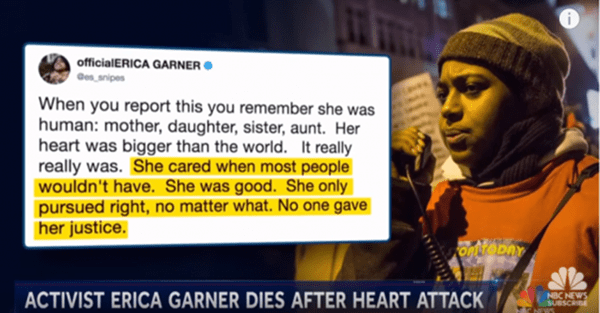These words are not a threat, they’re a fact. And nothing could more powerfully demonstrate this fact than the life and death of anti-racist activist Erica Garner.
Erica Garner’s untimely death at age 27 drew the year 2017 to a bitter close. After three and a half years of struggling for justice in the wake of her father, Eric Garner, being choked to death by the New York Police Department – after bi-weekly vigils and die-ins and marches, petitioning and organizing, standing in solidarity with others who lost loved ones to police violence and systemic racism, of raising her voice on behalf of those whose voices were silenced – racism broke her heart.
If you don’t know very much about Erica Garner, I recommend you go to her official website and read her own words. Then read this beautiful tribute from her friend, Kristen West Savali, and this reflection from her family lawyer, Reggie Harris. Those who knew her – who struggled with her and felt her love as they worked together to make black lives matter to an uncaring, exploitive nation – they give us the clearest glimpses of her life and message. Those in the trenches with Erica can tell her story.
The best I can do to try to honor Erica Garner is listen and point to those who knew her and take up my responsibility in the struggle for racial justice. One aspect of that struggle is helping people understand that Black Lives Matter and movements to hold law enforcement accountable are driven by concern for the health and safety of communities, not a sense of revenge. I know there are people who distrust or even denounce social justice work because they confuse it with vengeance. There are people who interpret “No justice, no peace,” as a threat to return violence for violence. It would be more appropriate to interpret this phrase as a wake-up call to the reality of insecurity and instability that keep people living under injustice from being at peace. Those who only see the warning, and not the reality, of these words will never be able to understand and support those who are crying out for their survival.
There is indeed a warning in this message. A society that perpetuates injustice cannot survive forever; people will rise up in defense of themselves. A society where black people are killed with impunity is not safe and certainly not peaceful for them, and the peace others may experience in such a society is a false and unstable peace. But the violence of injustice that makes life hell for African Americans in this country is not echoed in peaceful marches and protests. It can be unnerving to have our eyes opened to injustices that we may participate in or perpetuate, but it is not violent. The media has a history of stoking anxieties and raising defenses by portraying peaceful protests as riots, and social pressures and conventions make white people uncomfortable when our prejudices and biases are pointed out to us. But those of us with white privilege need to lower our defenses, lower our voices, and open our eyes to the reality around us. Injustice kills. Without justice, no one can be at peace.
Erica Garner’s life and death remind us that when racism claims a life, when violence claims a life, when enmity claims a life, so many more lives are affected. Violence is never limited, never contained in the body of the one injured or killed. The deep, systemic violence of structural racism which affects all black and brown lives personally is compounded by the suffering that spreads through families and communities when one person is subjected to injustice. Deep and intertwined networks of human pain flow from systems of dehumanization and oppression.
Racism can kill immediately, through chokeholds or gunshots or rough rides, but it also kills slowly, through stress, trauma, and heartache. In fact, studies have shown that black women bear long-term costs – physical and emotional as well as financial – of police violence when black men are physically arrested, assaulted, or killed (which is not to say that these immediate acts of violence do not also happen to women.) From the financial burdens of court costs and income loss to increased stress of childcare without extra support to the emotional torment of a system that overwhelmingly justifies excessive police force, the burdens of excessive police force and a racially-biased criminal justice system (to name just two manifestations of racism) are less publicized but just as brutal for women as they are for men.
Erica Garner bore the grief and trauma of losing her father while striving for justice not only for herself, but for all who shared her fate of losing a loved one to a violent racist system. In her empathy and compassion, she took the pain of so many grieving families along with her own into her fight. She struggled against the racism that continued to take one black life after another until it took her own.
Her autopsy won’t identify injustice as the cause of her death, but it is clear that racism would not allow Erica Garner to live in peace. “No justice, no peace,” is meant to rouse from complacency all who don’t feel the crushing load of injustice. It is a wake-up call to a reality that privilege obscures. There is no peace in a nation in which a man can be choked to death for selling loose cigarettes (which Eric Garner was not doing at the time of his fatal arrest) and a badge shields his killer from consequences. There is no peace in a nation in which a man feels a need to extra-legally sell cigarettes in order to provide for a family with six children. There is no peace in a nation where the average white household has 16 times the wealth of the average African American household, in large part because white families were able to pass down wealth that was non-existent to Africans who worked for no wages under slavery and low wages under segregation. There is no peace in a nation that has a school-to-prison pipeline for African American children. A nation that ignores, rationalizes or justifies cruelty and inequality is not at peace.
The phrase, “No justice, no peace,” therefore, is an acknowledgement of violence in the present. Any sense of peace one can have while others suffer from the insecurity, trauma, and hopelessness of injustice is a false peace, a peace built on victimization (even if unconscious). That kind of peace is unsustainable and will collapse in crisis. Until there is justice, peace is worse than an illusion; it’s a lie that conceals suffering.
Ours is not a peaceful nation, because it has been built on a foundation of injustice. Erica Garner worked for justice – not only for consequences for officers who act as judge, jury and executioner, but also for a more compassionate criminal justice system and a world where black lives matter. She and so many others lived and died waiting and working and struggling for justice, for recognition of their human dignity, for an end to the systemic violence that includes employment and housing discrimination, targeting and unequal treatment in the criminal justice system, substandard treatment in health and education, and so much more. They strove for the rights that we all should be able to take for granted. And when the rights of some are in jeopardy, the rights of all rest on a flimsy foundation. A nation built on violence will collapse.
If we want to create a peaceful world, we must follow Erica Garner’s lead and work for justice.
Stay in the loop! Like Teaching Nonviolent Atonement on Facebook!












